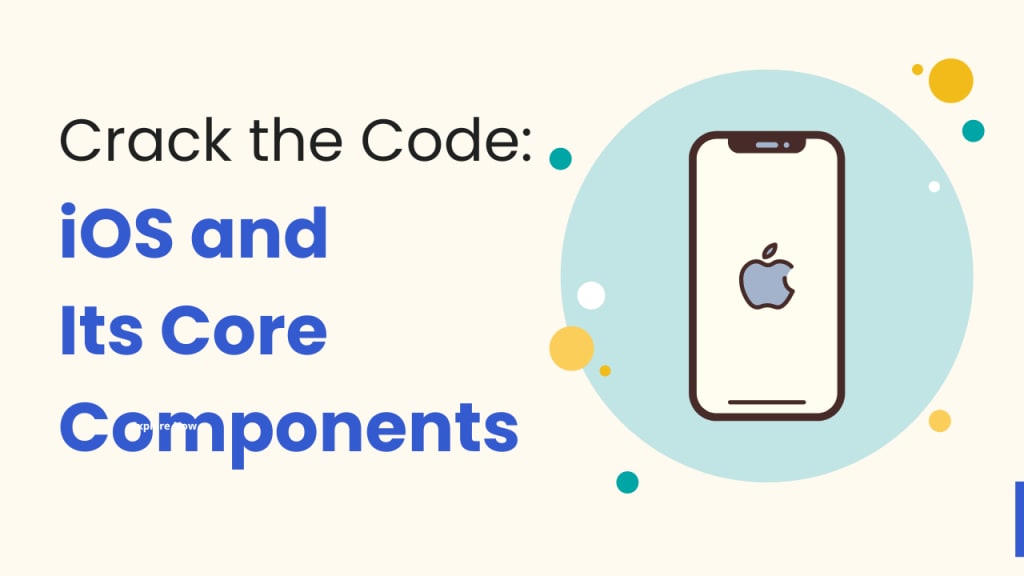
iOS is Apple’s flagship Operating System and is considered one of the most robust OSs in the industry. If you’re an enthusiastic individual keen to learn about iOS, its main components and the tools required to build an impeccable iOS app, this guide fits the bill for you.
This guide will equip you with a deeper understanding of the iOS ecosystem, making it easy for you to build an iOS app.
What Exactly is iOS?
Apple has become a leader in innovation thanks to iOS, which is renowned for its innovative design and flawless performance. iOS has completely changed the digital scene. With every new version of iOS, there are a number of improvements added to improve the user experience. With its strong security features and user-friendly interfaces, iOS is designed to give all users a stable and safe environment.
It's not just an operating system; it's an integral part of millions' daily lives. Apple has remained quite active in rolling out frequent upgrades to iOS. For instance, Apple recently announced new options for app distribution and payment processing, which are beneficial for developers.
“Apple today announced changes to iOS, Safari, and the App Store impacting developers’ apps in the European Union (EU) to comply with the Digital Markets Act (DMA). The changes include more than 600 new APIs, expanded app analytics, functionality for alternative browser engines, and options for processing app payments and distributing iOS apps.” - Apple’s PR
iOS is Apple Inc.'s mobile operating system that powers its line of iPhones, iMacs, MacBooks, iPads and Apple Watches. As a cornerstone of Apple’s technology ecosystem, iOS is designed to deliver a smooth, user-friendly experience, seamlessly integrating hardware with software to maximize performance and user satisfaction.
When Did It All Start?
Since its 2007 release, when the original iPhone was also released, iOS has undergone multiple revisions and versions, each of which brought new features and functionalities. It was renamed iOS in 2010 to reflect its wider use across Apple's mobile devices after being known as iPhone OS initially.
What are the Various Components of an iOS App?
A. Core Components of iOS
1. The iOS Kernel
The Unix-based kernel of iOS is essential to its efficiency and operational integrity. This foundation is renowned for its dependability and strong security features. This kernel does more than just run in the background; it actively controls system resources and makes it possible for important hardware-software interactions to occur. This kind of control is essential for increasing battery life and performance.
The iOS kernel guarantees that devices can easily and sustainably manage many tasks through effective resource allocation and power consumption management.
B. User Interface Components
1. UIKit
UIKit lies at the core of iOS's sophisticated and aesthetically beautiful user interface, which is one of the platform's most notable aspects. With UIKit, developers can create graphical, event-driven applications for iOS with a foundational architecture and a plethora of tools for managing and designing user interfaces.
With UIKit, developers can create applications that are responsive, visually appealing, and compliant with Apple's UI requirements. The platform is robust and versatile, and it can handle anything from views to application interactions.
2. SwiftUI
SwiftUI was introduced in 2019 as a modern UI framework that enhances interface design across all Apple platforms, including iOS. SwiftUI revolutionizes the way developers create user interfaces with its declarative syntax and state-driven logic, which simplifies the process and speeds up development.
You can consider it as an improved version of the UIKit.
Improved and interactive app designs are made possible by this framework, which can react and adjust automatically to various device characteristics like screen density, orientation, and size. SwiftUI and UIKit integrate seamlessly, giving developers the freedom to mix and match components of the two frameworks to maximize the functionality and design of applications.
C. Developer Tools
1. Xcode
Xcode is the foundation of iOS development, a comprehensive and powerful environment that supports building, testing, and debugging applications. This integrated development environment (IDE) is tailored specifically for the Apple ecosystem and supports programming languages such as Swift and Objective-C.
Xcode includes everything developers need, from a source code editor to various tools to efficiently build apps. It also features a simulator and a wide range of diagnostic tools to ensure that your application behaves properly under various conditions.
2. Swift
Swift, Apple's exclusive programming language, is famous for its clean language structure, which is simple to learn and maintain. Planned to be both effective and user-friendly, Swift minimizes the potential for mistakes and improves execution, making it a more secure and dependable choice for engineers.
Since its adoption, Swift has gained quick recognition due to its capacity to deliver computer programs that run quickly and its energetic libraries, which decrease the impression of apps.
D. Core Services
1. iCloud
iCloud stands as a basic component of iOS, providing consistent integration and synchronization of information across all Apple devices. Apple users can store information such as photographs, recordings, reports, and app information safely within the cloud and get to it from any gadget, anytime.
iCloud offers key functionalities such as iCloud Backup, Discover My iPhone, and iCloud Drive, thus upgrading the iOS experience.
2. Core Motion
Another noteworthy highlight of iOS is Core Motion, a system that saddles gadget movement sensors to supply real-time information that applications can utilize for different purposes, from wellness following to navigational helps. By translating accelerometer, gyroscope, magnetometer, and barometer information, Core Motion helps apps provide more personalized and responsive experiences. It is especially pivotal in wellbeing and wellness apps, where it contributes to the checking of physical exercises and, in general, wellness, playing a central part within the burgeoning health-tech segment of mobile applications.
Through these core components, iOS provides a comprehensive, secure, and user-friendly platform that supports the usefulness of millions of gadgets around the world.
If you want to learn “how to develop an iOS app from scratch” then, read this comprehensive guide!
How iOS Differs From Other Operating Systems
iOS stands out from other operating systems in several distinctive ways. Here are some key points highlighting how iOS differs from its competitors:
1. Integrated Ecosystem and Hardware Optimization:
Unlike other operating systems which often need to cater to a wide range of hardware configurations, iOS is exclusively designed for Apple devices. This exclusivity allows for highly optimized performance where both the hardware and software are finely tuned to work in coordination. This results in faster response times, smoother interactions, and greater overall efficiency.
2. Security and Privacy:
iOS is renowned for its robust security features and strong commitment to user privacy. Apple controls every aspect of the system architecture, from hardware to the App Store, creating a controlled environment that reduces vulnerabilities. iOS devices receive regular updates that patch security holes and protect against malware and viruses, a practice that is more uniformly applied than in many other ecosystems. Additionally, Apple’s privacy policies are strictly enforced within the app ecosystem, limiting third-party access to user data without consent.
3. User Interface Consistency:
Apple emphasizes clean, intuitive design across its product range. iOS users benefit from this consistency in user interface (UI) design, which enhances usability and user satisfaction. This is in contrast to other operating systems, where the user experience can vary significantly between devices and manufacturers due to custom modifications.
4. App Quality and Ecosystem:
The iOS App Store maintains strict app review guidelines and quality control measures that all applications must pass before being available to the public. This rigorous review process tends to ensure a higher standard of app quality on iOS compared to other platforms. Additionally, developers often prioritize releasing new features or entire apps on iOS due to the platform's profitable user base.
5. Software Updates:
iOS users generally receive software updates at the same time, regardless of their location. This uniform distribution model ensures that nearly all active devices are up to date with the latest features, security patches, and improvements. In contrast, updates on other platforms can be inconsistent, with some users waiting months for the latest operating system upgrades, depending on their device manufacturer and carrier.
These distinctions contribute to iOS’s reputation as a secure, user-friendly, and consistently high-performing mobile operating system, which maintains a loyal user base and remains a leading choice in the competitive mobile market.
Final Thoughts
iOS has significantly shaped the mobile computing landscape with its emphasis on design, functionality, and user privacy. It continues to be a benchmark for mobile operating systems, pushing the boundaries of what smartphones can achieve. As iOS continues to evolve, it will likely keep setting industry standards, influencing how mobile technology integrates into daily life.
About the Creator
Deftsoft
We offer various development services, such as AEM, Blockchain, Metaverse development services, website/mobile app development and digital marketing services.






Comments
There are no comments for this story
Be the first to respond and start the conversation.